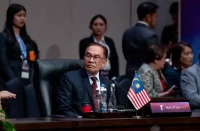African Union: step over the abyss
Less than a century has passed since 1960, when 17 African countries simultaneously declared their independence and aspiration for sovereignty. Over this short historical period, Africa has made a colossal breakthrough in its development. The abyss of problems faced by the young countries could wreck any undertaking and destroy any construction project. However, the situation gradually stabilized, which allowed Africans to dream of more than just maintaining power within their sovereign borders.
Pan-African integration was one of the main achievements of the continent. In September 1960, the Soviet Union came up with a project on liberating all African territories from colonial dependence at the UN General Assembly and in December of the same year the resolution was approved. In less than three years after those historic resolutions, on May 25, 1963, the new states set up the Organization of African Unity (OAU).
It was headquartered in Addis Ababa. The place was not selected randomly. Ethiopia is the only country in Africa that managed to escape colonization. It managed to smash Italy’s ambitions. In addition, Addis Ababa is the highest mountain capital on the continent and one of the highest mountain ones in the world. The symbolic height that 32 African countries cleared in 1963 should now be maintained and protected from the challenges of the time, setting an example for other neighbors. It has turned out that this is not an easy task to do.
As early as in 1966, the first President Kwame Nkrumah, who was the leader of the anti-colonial movement and one of the main initiators of OAU creation, was overthrown in Ghana. This was followed by a series of coups and successive military dictators. It became clear that African countries would first have to pass a sovereign personality test.
The continent became an arena for cold war tensions, interethnic conflicts, a base for terrorists, arms and drug dealers and a symbol of instability in world politics. This background still torments African countries. However, the development of political processes continued all these years and the local elites’ inspiration by the ideas of fighting colonialism only strengthened their desire for the sovereignization of government authorities.

Everyone faced similar problems and the Organization of African Unity declared resolving territorial conflicts, disputes and disagreements between countries as its main mission. Membership in the OAU was based on sovereignty. Thus, the organization became its guarantor. The very fact of being a member of the OAU club provided a certain legitimacy to the political borders of the member countries. Their ability to maintain independence was fueled, among other things, by the recognition of such independence by their neighbors.
Later on, in 1991, riding on the wave of the global popularity of economic integration, primarily due to EU processes, African countries proclaimed the creation of a single economic community within the OAU. 48 countries already participated in it. However, the ambitious goals turned out to be somewhat premature.
The African Economic Community broke up into several regional associations (including subgroups: customs and currency zones). The cross membership of different countries in blocs such as IGAD, COMESA, ECOWAS, UEMOA, EAC and others created a complex picture replete with overlapping interests. A new step was required towards achieving continental unity. So, in July 2002 AOE was transformed into the African Union (AU).
This time, Libyan leader Muammar Gaddafi acted as the main promoter of reforms. The Constitutive Act of the African Union and the plan for the new organization were adopted on his initiative. A large-scale development strategy program was also approved at that time, the New Partnership for Africa’s Development, NEPAD.
Permanent bodies responsible for coordinating African states’ policies were set up: the Heads of State and Government Implementation Committee (HSGIC) and its governing body represented by 20 AU member states.
Three states of each region of the African Union became HSGIC members. It was also decided to hold HSGIC meetings several times a year. The new body also became the main mediator in relations between African states and international organizations such as the World Bank, G8, European Commission, UN Economic Commission for Africa and others, including partnerships with major transnational companies.
HSGIC identified eight development priorities for Africa: political, economic and corporate governance; agriculture; infrastructure development; education; healthcare; science and technology; market access and tourism; environment. The committee constantly discusses general and particular solutions dealing with all these areas.
The African Union and its bodies wield enormous influence in Africa. It is a very reputable organization, thanks to which African countries articulate a consolidated stance on many issues.
It should be noted, however, that even before the liberation of Africa from colonial dependence, various pan-African entities came to exist that had set up a communication process between elites and leaders of African nations in the years since the Comintern and other organizations. Therefore, there are very diverse mechanisms used to coordinate positions in Africa.
Integration in Africa does not mean giving up sovereignty but, on the contrary, strengthening it. It is motivated pretty much by political interests than economic ones. And it is with the help of the bodies of the African Union that the countries of the continent are rigidly committed to maintaining their sovereignty.
The resolutions of the African Union are non-binding in nature which may change in the future. For example, in 2016, a uniform draft of African passport was designed; it was supposed to replace existing national passports to enable traveling freely across the continent. The initiative was supported by Rwanda, Chad and a number of other countries; moreover, they began to issue such passports; however, a number of borders remain closed for it as neighbors are afraid of adverse pressure on their labor markets and security risks.
The 2063 Agenda was adopted providing for a number of activities covering a fifty-year perspective and matching sustainable development goals. The plan includes the creation of a unified financial infrastructure, network of high-speed roads and a pan-African data transmission network; joint development of resources and manufacturing of export-grade products; cessation of all wars and civil conflicts; elimination of gender inequality; a strategy for the use of space technologies; cooperation in the field of cyber security and a number of other initiatives.
There are also plans to compile an “African Encyclopedia”, a reputable resource that will share information on the true history of the continent and African life. It must contribute to shifting away from European-centric and Western-centric concepts.
to be continued














Comments